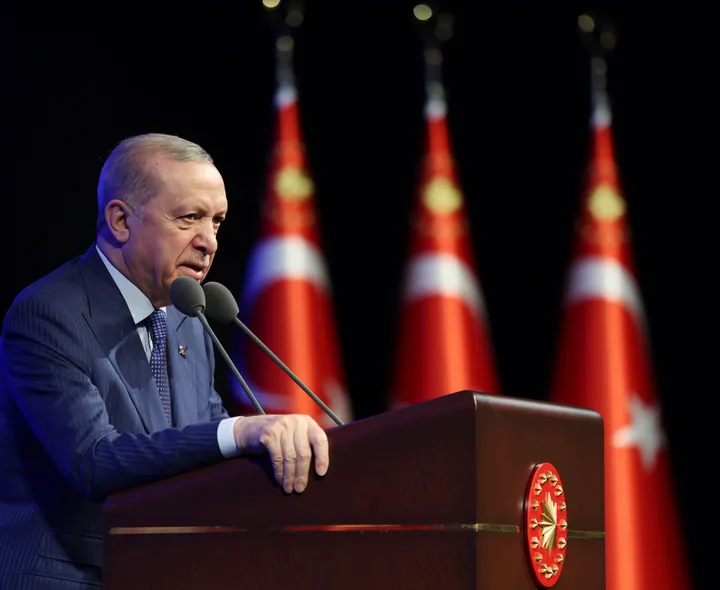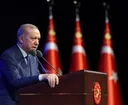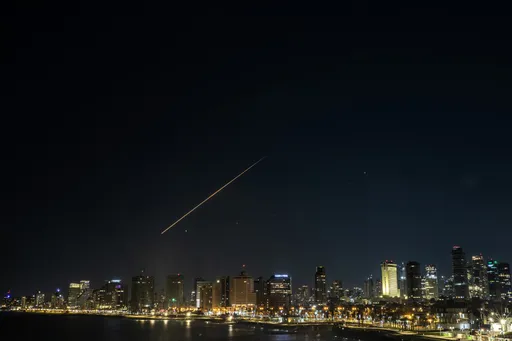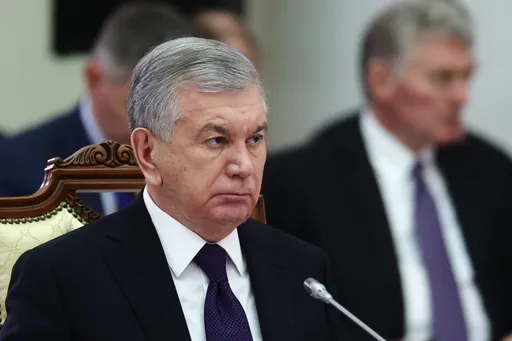US President Donald Trump said Saturday that Turkey “was not allowed to buy Patriot missiles by the Obama administration” and his administration is looking at different solutions regarding its purchase of Russia’s S-400 missiles.
"Turkey is a NATO member and was not treated fairly," Trump said in a joint presser with Turkish President Recep Tayyip Erdogan, referring to the Obama administration's reluctance to sell Patriots to Turkey in 2013.
Asked about possible sanctions against Turkey, Trump said “we are looking at it, but it’s a two-way street”.
Trump also touched on the trade volume between Turkey and the US, saying "$75 billion is small. I think it is going to be well over $100 billion soon."
He also said he will visit Turkey this year. Asked if it will be in July, he said the date is not set yet.
No sanctions
President Trump said there will be no US sanctions imposed on Turkey over its decision to purchase Russian missile defence systems, President Erdogan said, hours after the two leaders held bilateral talks.
Erdogan said at a news conference that Turkey expected the delivery of F-35 stealth fighter jets from the United States, despite the dispute over the S-400 deal.
Khashoggi murder
President Erdogan also touched on the issue of journalist Jamal Khashoggi's murder.
Saudi Arabia's Crown PrinceMohammed bin Salman must uncover the killers of Khashoggi, Erdogan said, adding that some aspects of the murder were still being hidden.
He said a 15-person team that arrived in Istanbul before the killing were responsible and he said there was "no point in looking for perpetrators elsewhere."
He also said the killers should be prosecuted in Turkey.
Morsi's death
Erdogan urged the international community to hold a probe into the death of Mohamed Morsi, the first democratically elected president of Egypt who died on June 17.
Morsi, a leading member of Egypt’s Muslim Brotherhood, won Egypt’s first free presidential election in 2012. After only a year in office, however, he was ousted and imprisoned in a military coup led by then-defence minister Sisi.
"The statements from the [Egyptian] putschists are far from satisfying the conscience," he said, adding Morsi was not given any medical help for half an hour when he collapsed during his trial.
Erdogan said shedding light on Morsi's death was of huge importance for the sake of democracy and politics worldwide.
Refugee crisis
President Erdogan said he told his counterparts about the "sacrifices" Turkey has made since 2011 when the Syrian civil war erupted, prompting influx of millions of refugees into Turkey.
"Since 2011, we have opened our door to over four million refugees, including 3.6 million Syrians who fled the clashes," Erdogan said, adding regional countries were the only ones taking the responsibility of irregular migrants.
Erdogan said Turkey, according to the UN calculations, have spent over $37 billion whereas the international organisations have allocated some $2 billion dollars. The UN Refugee Agency provided a total of a billion dollar for the refugees in Turkey, he added.
He said the developed Western countries who lecture others about human rights have failed at humanitarian dimension of the Syrian conflict.
"As long as conscious-based policies are not preferred over prejudices against refugees, more toddlers will die in the sea," he said, referring to Aylan Kurdi — a three-year-old Syrian toddler, who drowned on a Turkish coast in 2015 while trying to cross to Europe.
Syria has been locked in a vicious civil war since early 2011, when the Bashar al-Assad regime cracked down on pro-democracy protests.
According to the UN on Thursday, more than 230 civilians have lost their lives, more than 330,000 have fled in just six weeks, and three million more remain at risk.
Acts of terrorism worldwide
President Erdogan slammed the acts of terror that target civilians all around the globe and called on all countries to have a stance against terrorism.
"Terrorism should not be linked to any ethnicity or religion," Erdogan said, indirectly pointing to the rising discrimination against Muslims across the globe.
He added that the terror attacks in New Zealand and Sri Lanka were obvious examples that terror does not discriminate between targets.
At least 51 Muslim worshippers were massacred and as many injured in a white supremacist terror attack on two mosques in Christchurch, New Zealand.
On Easter Sunday, over 250 people were killed in Colombo city of Sri Lanka, majority of the victims were Christians.
"The identity of a terrorist [who targeted] Istanbul, Lahore, Beirut does not mean anything. Terror is an enemy of all humanity and human values," he asserted.
Erdogan criticised that there were "inconsistencies" against terror groups, especially in Syria, referring to the US support for the YPG/PKK in northern Syria.
"Some terror groups such as the YPG/PKK, which practice ethnic cleansing, take children under arms and impose forced migration to people, are held in high esteem," he said.
The PKK — listed as a terrorist organisation by Turkey, the US and the EU — has waged a terror campaign against Turkey for more than 30 years, resulting in the deaths of nearly 40,000 people, including women and children.
The YPG, PKK's Syrian branch, has managed to occupy one-third of Syria under the guise of fighting against Daesh with US support.
"Terror, just like a scorpion, will sooner or later sting the hand feeding it. Just like terror groups like Daesh, Al Qaeda, Boko Haram, Al Shabab pose a global security threat, the neo-Nazi organisations, as seen in New Zealand massacre, pose the same danger," he said.
Erdogan stressed that "some" Western countries provided shelter to terror groups such as Fetullah Terrorist Organization (FETO) under the guise of "political asylum".
On July 15, 2016, FETO and its US-based leader Fetullah Gulen orchestrated a defeated coup in Turkey, leaving 251 people martyred and nearly 2,200 injured.
Ankara also accuses FETO of being behind a long-running campaign to overthrow the Turkish state through the infiltration of institutions, particularly the military, police, and judiciary.
International trade
Erdogan stressed that international trade was one of the most vital elements of the G20 summit.
"We maintain our commitment towards the multilateral trade system that is open, free and based on rules," he said.
Erdogan went on to say that the steps to be taken, in the sense of reducing the tension that has peaked following "trade wars", should be compatible with the rules of World Trade Organization (WTO).
Climate change
Turkish top statesman said Turkey, among the G20 countries, stood as one of the countries with the "lowest" carbon emission.
Erdogan said the G20 approach towards climate change should be based on fairness. In addition, he said the countries' historical responsibilities and development levels should be taken into consideration while discussing climate troubles.
"We want the promises given to Turkey to be kept," he said, referring to the climate-titled summits in Paris and Buenos Aires.
Criticising permanent 5 of UN
Turkish president had openly, and repeatedly, slammed the dominance of the five permanent members of the UN Security Council (UNSC), saying "world is bigger than five."
"Abandoning the fate of 192 UN-member countries to the permanent five is not a right and fair approach. G20 Platform has a structure which is more democratic and surrounding," he said.
In line with the summit context, President Erdogan attended a special session on the theme of "Women’s Empowerment" and the final session of the summit dubbed "Climate Change – Environment and Energy".
Deal on track
Earlier, President Erdogan on Saturday said delivery of Russia’s S-400 missile defense system to Turkey is proceeding without delay.
Erdogan said Saturday at the start of talks with Russian President Vladimir Putin on the sidelines of the G-20 summit in Osaka, Japan, that the deal is a priority and there has been no setback in the deal with Moscow.
Tensions between the US and Turkey have mounted in recent months with Turkey set to begin receiving the advanced S-400 Russian surface-to-air missile defence system which Washington said will jeopardise Turkey's role in the US F-35 fighter jet program and could trigger congressional sanctions.
TRT World's Turkey analyst Yusuf Erim has more.
Putin hailed growing bilateral trade and a rising flow of Russian tourists to Turkey.
Russia and Turkey have closely coordinated their actions in Syria, signing a de-escalation deal for the northwestern province of Idlib, the last major rebel stronghold.
Earlier, Erdogan met with German Chancellor Angela Merkel for around 25 minutes.
No further details of the either meeting were provided.
Erdogan is also expected to meet UK Prime Minister Theresa May, Indian Prime Minister Narendra Modi and UN Secretary General Antonio Guterres on the second and final day of the gathering.
He will also attend a special session on the theme of "Women's Empowerment" and the final session of the summit with the theme “Climate Change - Environment and Energy“.
He will also hold a press conference at the Intex Osaka International Exhibition Center.























